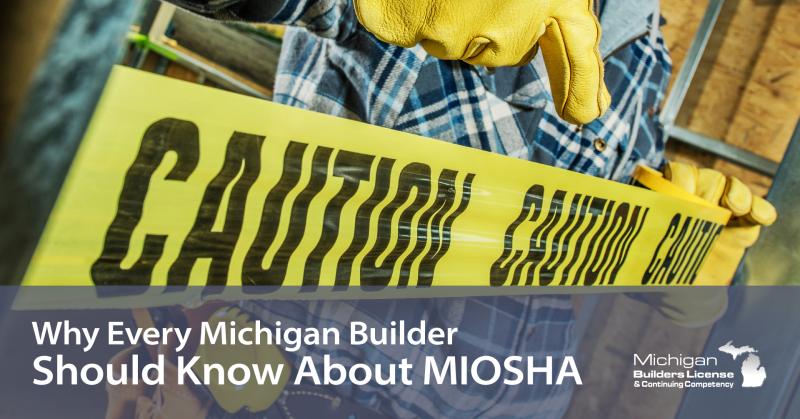Working in construction can be high risk, with workers being prone to accidents and injuries. Following proper safety procedures and guidelines can lower these risks for yourself and those you work with.
The Michigan Occupational Safety and Health Administration (MIOSHA) plays a critical role in ensuring the safety and health of workers in Michigan's construction industry.
Today, we'll be taking a closer look at MIOSHA, hazards in construction, and why knowledge of MIOSHA is essential for Michigan builders.
What is MIOSHA?
MIOSHA is the Michigan Occupational Safety and Health Administration, a state agency responsible for enforcing Michigan occupational safety and health standards.
MIOSHA ensures employers provide their employees with a safe and healthy workplace by enforcing regulations, providing education and training, and conducting inspections.
Most Common Construction Hazards
Construction sites are filled with potential hazards that can cause accidents and injuries.
The most common accidents in construction sites are slips, falls, and scaffolding accidents. Slip and fall accidents can occur due to wet or slippery surfaces, debris, or uneven terrain, and scaffolding accidents can occur due to faulty equipment or improper use of scaffolding. Construction workers are also at risk of electrical hazards, exposure to hazardous materials, and heavy machinery accidents.
Why It's Important To Understand MIOSHA
As a builder in Michigan, knowing MIOSHA regulations and guidelines is essential.
MIOSHA provides resources and training to help employers comply with safety regulations and identify potential hazards in the workplace.
Their safety regulations apply to all employers and employees in Michigan, regardless of the company's size.
They also have the authority to issue fines and penalties to employers who violate workplace safety standards.
Here are just a few examples of fines that MIOSHA has issued in recent years:
-
-
In 2021, a Michigan excavation company was fined $59,500 by MIOSHA for serious safety violations related to trenching and excavation operations. The violations included failing to protect employees from cave-ins, properly training employees on safe excavation practices, and providing a ladder or other means of egress for employees working in a trench.
-
In 2020, a roofing company in Michigan was fined $200,000 for exposing workers to fall hazards. The company failed to provide workers with proper fall protection equipment, resulting in multiple violations of MIOSHA regulations.
-
Also, in 2020, a Michigan manufacturer was fined $66,000 by MIOSHA for multiple safety violations, including failing to provide employees with fall protection equipment, failing to properly train employees on lockout/tagout procedures, and failing to properly label hazardous chemicals.
-
In 2019, a concrete company was fined $49,000 for exposing workers to silica dust hazards. The company failed to implement proper controls to protect workers from exposure to silica dust, which can cause respiratory problems and other health issues.
-
Also, in 2019, a Michigan roofing company was fined $103,500 by MIOSHA for willful and serious safety violations related to fall hazards. The violations included failing to provide employees with fall protection equipment and failing to properly train employees on safe work practices.
-
By following MIOSHA regulations and guidelines, Michigan builders can avoid costly fines, prevent accidents and injuries, and ensure a safe workplace for their employees.

